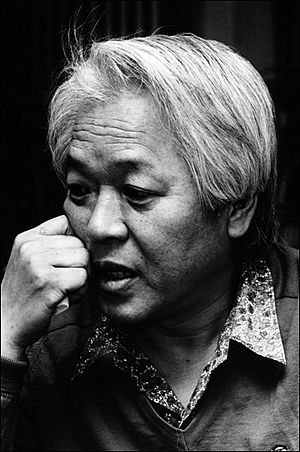Yi Cheong-jun facts for kids
Quick facts for kids
Yi Cheong-jun
|
|
|---|---|
 |
|
| Born | August 9, 1939 Jangheung, Japanese Korea |
| Died | July 31, 2008 (aged 68) Seoul, South Korea |
| Language | Korean |
| Nationality | South Korean |
| Alma mater | Seoul National University |
| Period | 1965–2008 |
| Notable works | The Wounded (1966) Seopyeonje (1976) Your Paradise (1976) |
| Korean name | |
| Hangul | |
| Hanja | |
| Revised Romanization | I Cheong-jun |
| McCune–Reischauer | Yi Ch'ong-chun |
Yi Cheong-jun (Korean: 이청준, 9 August 1939 - 31 July 2008) was a very important South Korean novelist. He wrote for over 40 years. During this time, he created more than 100 short stories and 13 novels.
Contents
About Yi Cheong-jun
His Early Life
Yi Cheong-jun was born in 1939. He studied German literature at Seoul National University. In 1965, he published his first short story. It was called Toewon, which means "Leaving the Hospital".
Two years later, he won a big award. It was the Dongin Literature Award for his story The Wounded. Yi Cheong-jun passed away in 2008. He was 68 years old and died from lung cancer.
His Stories and Themes
Yi Cheong-jun is seen as one of the best writers from his time. He wrote many stories with different topics.
His book The Wounded (1966) looked at how young Koreans felt after the war. This Paradise of Yours (1976) was about kindness and power. It was set in a place for people with leprosy called Sorokdo Island. The Fire Worshipers (1985) thought about human traditions. It asked what they mean in a world without a clear God. Yi Cheong-jun's stories covered many ideas. These included politics, life's meaning, and big questions about the world.
Language and Society
One main idea in his stories was language. He saw language as a way to find truth. The Walls of Rumor (1972) showed how people's freedom to speak was stopped. This happened in Korea when the country was divided.
Stories in In Search of Lost Words (1981) also explored this. They looked at how political problems affected language. When language is twisted by strict rules, it can hurt people's minds. Yi Cheong-jun's stories often linked unfair systems to how language is used.
Art and Life
Another favorite topic for Yi Cheong-jun was the role of art. Early stories like The Falconer showed artists. These artists worked hard to make their art perfect. Sometimes, they gave up normal happiness for their craft.
Later, Yi Cheong-jun found ideas in traditional Korean folk art. He was inspired by the Korean spirit in these arts. For example, his work Seopyeonje (1993) focused on pansori. This is a traditional Korean performance. It features a singer telling stories with a drummer. In this story, art helps people deal with life's troubles. It also helps them rise above them. Seopyeonje was made into a very popular movie. This movie also made many people interested in pansori again.
Books in English
Here are some of Yi Cheong-jun's books that have been translated into English:
- The Snowy Road and Other Stories (단편소설선 <눈길>)
- Your Paradise (당신들의 천국)
- The Prophet and Other Stories (이청준 소설선 <예언자> 외)
- Seopyeonje (서편제)
- The Cruel City and Other Korean Short Stories (한국대표단편선(2))
- Two Stories from Korea: "The Wounded" and "The Abject"
Movies Based on His Works
Many of his stories have been made into movies or TV shows. Famous directors have brought them to the screen.
- Iodo was directed by Kim Ki-young in 1977.
- Seopyeonje was directed by Im Kwon-taek in 1993. It's about a pansori master traveling with his adopted children.
- Beyond the Years was also directed by Im Kwon-taek in 2007. This movie was based on The Wanderer of Seonghak-dong.
- Secret Sunshine was directed by Lee Chang-dong in 2007. Its story came from Yi Cheong-jun's short story A Story of a Worm.
A critic named Kim Byeong-ik said something important. He said Yi Cheong-jun helped start a new era for Korean literature. This happened before modern Korean literature truly began in the 1960s.
Awards He Won
- Dong-in Literary Award for The Wounded (1967)
- Yi Sang Literary Award for The Cruel City (1978)
- Korean Literature Prize for The Fire Worshipers (1985)
- Isan Literature Prize for The Gate of Liberty (1990)
- Ho-am Prize in the Arts (2007)
See also
 In Spanish: Yi Chong-jun para niños
In Spanish: Yi Chong-jun para niños
- Korean literature
- Cinema of Korea
- Park Kyung-ni
 | Claudette Colvin |
 | Myrlie Evers-Williams |
 | Alberta Odell Jones |

